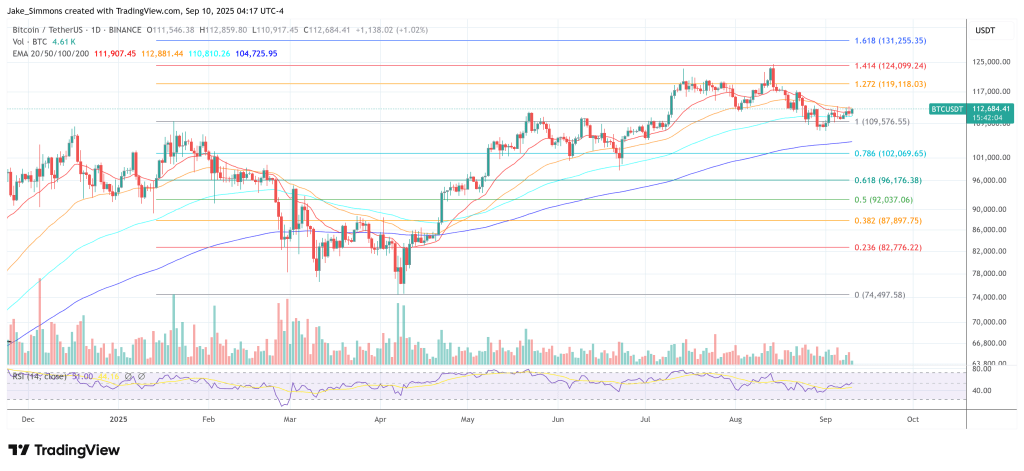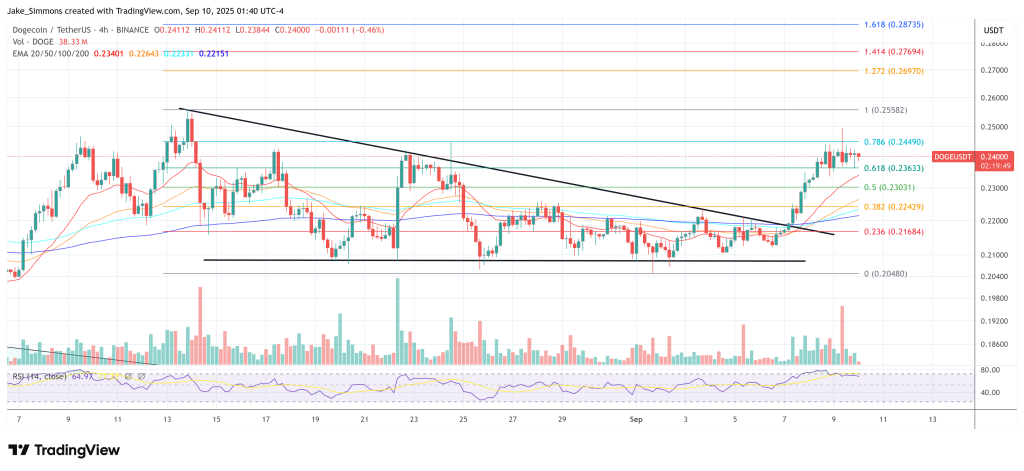Kyrgyzstan has taken a concrete step toward creating a state-held reserve of crypto assets—centered, in practice, on Bitcoin—alongside government-backed mining operations.
Kyrgyzstan Targets Bitcoin Reserve And State Mining
At a September 9 hearing of the Zhogorku Kenesh (parliament) Committee on Budget, Economic and Fiscal Policy, Minister of Economy and Trade Bakyt Sydykov said draft amendments to the Law “On Virtual Assets” would introduce the concepts of “state mining” and a “state cryptocurrency reserve.”
He argued the reserve would be built through several channels—“mining, tokenization of real assets and the issuance of stablecoins backed by the national currency”—and that the mechanism would “strengthen the country’s financial stability and provide new accumulation tools.”
The minister anchored the discussion in hard numbers about the sector’s scale. From January through July 2025, turnover across companies operating in Kyrgyzstan’s crypto economy “exceeded 1 trillion soms,” generating “900 million to 1 billion soms” in tax revenue. Official registries now list 169 crypto exchangers, 13 crypto exchanges and 11 mining firms, Sydykov said.
Energy security—and what asset the state would actually mine—dominated the committee exchange. MP Dastan Bekeshev warned that “about 800 thousand kilowatts are required to mine one bitcoin. This is enough energy to power about 1,200 apartments for a month. Winter is coming—is it worth the risk?”
In reply, Sydykov said Kyrgyzstan applies separate power tariffs to mining and that the state would adhere to them. He stressed no mining farms would be sited at thermal power plants (TPPs) or at the under-construction Kambar-Ata-1 hydro facility. “The main purpose of thermal power plants and hydroelectric power plants, including the Kambar-Ata-1 under construction, is not related to mining. The capacity of small hydroelectric power plants is used for this area: 17 of them are currently operating, and another 15 projects are under implementation,” the minister said.
The draft overhauls market rules as well. Sydykov said that beginning January 1, 2026, any crypto exchange seeking to operate domestically must hold at least 10 billion soms in authorized capital—a prudential bar the government says is designed to “strengthen confidence in the market and develop the crypto industry in the country.”
Local media tracking the bill’s progress note that “state mining” is defined as the extraction of digital assets using state energy, infrastructure and technological resources, with the reserve to be formed not only from mining proceeds but also from token issuance and acquisitions of virtual assets owned by the state.
While the bill’s language consistently uses “cryptocurrency reserve,” the committee exchange and risk framing centered on Bitcoin. Bekeshev’s power-use comparison explicitly referenced “one bitcoin,” and the government’s preferred supply source—mining—points to BTC first.
Kyrgyzstan Races Kazakhstan In Central Asia’s Crypto Push
That practical emphasis also aligns with prior policy signaling. In mid-April, Kyrgyzstan’s National Investment Agency signed a strategic memorandum with Binance co-founder Changpeng Zhao, formally appointing him as an advisor on national blockchain policy and Web3 strategy. In early May, during a visit to Bishkek, Zhao publicly suggested that the country use Bitcoin—alongside BNB—as the initial assets for a national crypto reserve.
The push comes as Kyrgyzstan’s crypto sector has become both a budget contributor and a geopolitical flashpoint. The surge in domestic platform activity has coincided with Western sanctions scrutiny, including British and US measures in August targeting entities linked to a rouble-pegged stablecoin network and Kyrgyz firms alleged to have aided Russian sanctions evasion—pressure that prompted President Sadyr Japarov to publicly appeal to Washington and London. The government has rejected wrongdoing claims and emphasized that crypto-related banking operations are under state oversight.
Regional context is shifting in parallel. Neighboring Kazakhstan has just proposed creating a national “crypto reserve fund” under its State of the Nation blueprint, part of a broader digital-assets agenda that includes a pilot “CryptoCity” and new legislation by 2026.
Analyst Daniel Batten highlighted a key difference with other Bitcoin-curious states, noting on X that, “Unlike El Salvador, Pakistan, Argentina, CAR, Kazakhstan does not have an IMF loan—so this order is likely to go through unimpeded.” If Astana proceeds, it would mark a second Central Asian sovereign building a formal digital-asset buffer, intensifying regulatory and competitive dynamics in the region.
At press time, Bitcoin traded at $112,684.


You can get bonuses upto $100 FREE BONUS when you:
💰 Install these recommended apps:
💲 SocialGood - 100% Crypto Back on Everyday Shopping
💲 xPortal - The DeFi For The Next Billion
💲 CryptoTab Browser - Lightweight, fast, and ready to mine!
💰 Register on these recommended exchanges:
🟡 Binance🟡 Bitfinex🟡 Bitmart🟡 Bittrex🟡 Bitget
🟡 CoinEx🟡 Crypto.com🟡 Gate.io🟡 Huobi🟡 Kucoin.








Comments